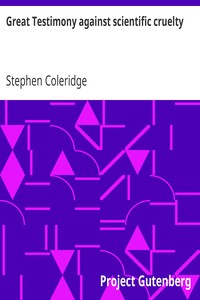Great Testimony against scientific cruelty by Stephen Coleridge
"Great Testimony against Scientific Cruelty" by Stephen Coleridge is a compelling historical account written in the early 20th century, specifically around the time of World War I. This book serves as a strong critique against vivisection and the cruelty inflicted upon animals in the name of scientific progress, reflecting the ethical debates that arose during the Victorian and Edwardian eras related to animal rights and welfare. In this work, Coleridge gathers together
the voices of influential individuals from various fields—including poets, philosophers, and religious leaders—who condemned vivisection. The text highlights the efforts of figures like the seventh Earl of Shaftesbury, Miss Frances Power Cobbe, and Cardinal Manning, among others, as they fought against animal cruelty and advocated for ethical treatment. Through vivid illustrations and powerful rhetoric, Coleridge articulates the moral imperatives dictating a need for compassion towards animals, while confronting the cold rationality of so-called scientific pursuits that disregard the suffering of sentient beings. This book profoundly questions the ethics of scientific methodology that endorses cruelty, urging society to recognize and rectify such abominable practices. (This is an automatically generated summary.)
Read or download for free
| How to read | Url | Size | |||
|---|---|---|---|---|---|
| Read now! | https://www.gutenberg.org/ebooks/26074.html.images | 103 kB | |||
| EPUB3 (E-readers incl. Send-to-Kindle) | https://www.gutenberg.org/ebooks/26074.epub3.images | 1.4 MB | |||
| EPUB (older E-readers) | https://www.gutenberg.org/ebooks/26074.epub.images | 1.4 MB | |||
| EPUB (no images, older E-readers) | https://www.gutenberg.org/ebooks/26074.epub.noimages | 105 kB | |||
| Kindle | https://www.gutenberg.org/ebooks/26074.kf8.images | 1.6 MB | |||
| older Kindles | https://www.gutenberg.org/ebooks/26074.kindle.images | 1.6 MB | |||
| Plain Text UTF-8 | https://www.gutenberg.org/ebooks/26074.txt.utf-8 | 90 kB | |||
| Download HTML (zip) | https://www.gutenberg.org/cache/epub/26074/pg26074-h.zip | 1.4 MB | |||
| There may be more files related to this item. | |||||
Similar Books
About this eBook
| Author | Coleridge, Stephen, 1854-1936 |
|---|---|
| LoC No. | 18019596 |
| Title | Great Testimony against scientific cruelty |
| Credits | Transcribed from the 1918 John Lane edition by David Price |
| Reading Level | Reading ease score: 49.5 (College-level). Difficult to read. |
| Language | English |
| LoC Class | HV: Social sciences: Social pathology, Social and Public Welfare |
| Subject | Vivisection |
| Category | Text |
| EBook-No. | 26074 |
| Release Date | Jul 16, 2008 |
| Copyright Status | Public domain in the USA. |
| Downloads | 178 downloads in the last 30 days. |
| Project Gutenberg eBooks are always free! | |

